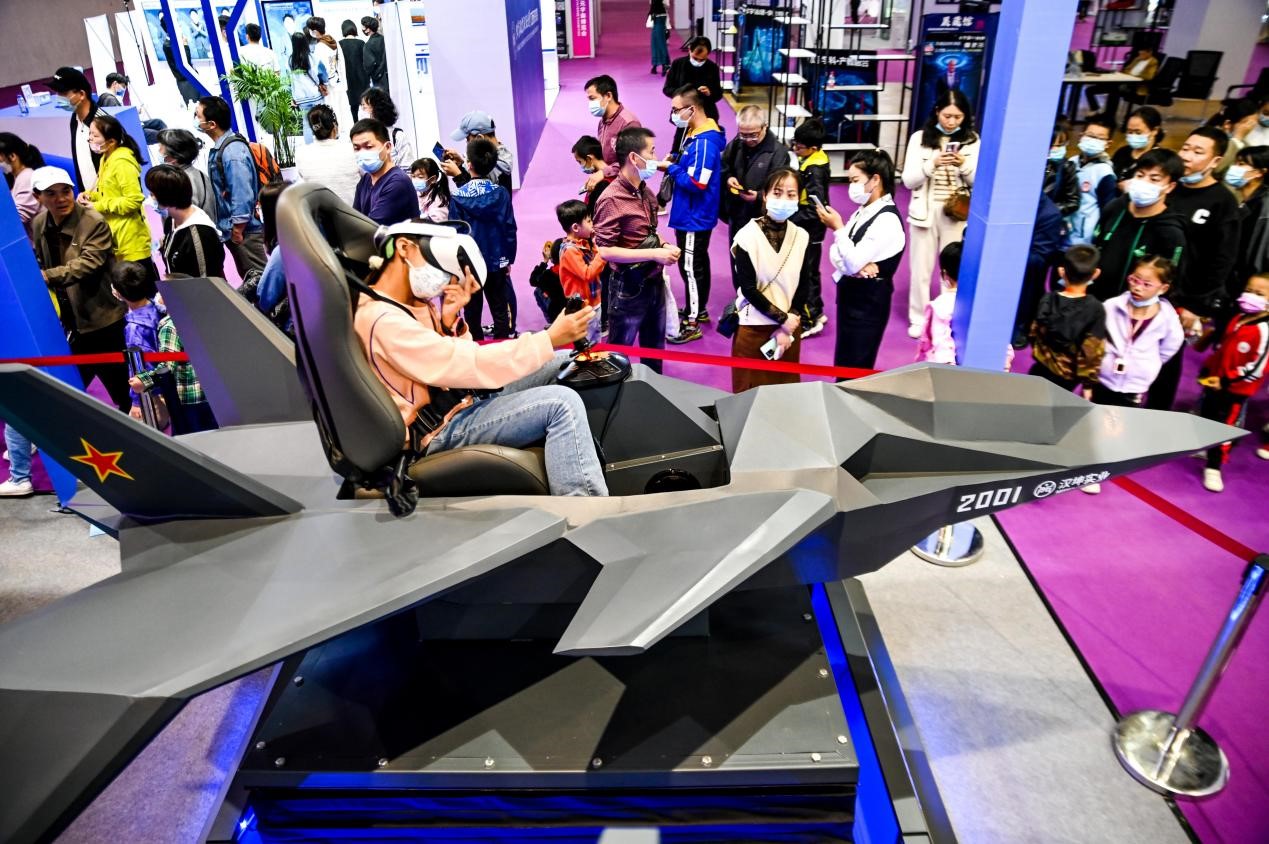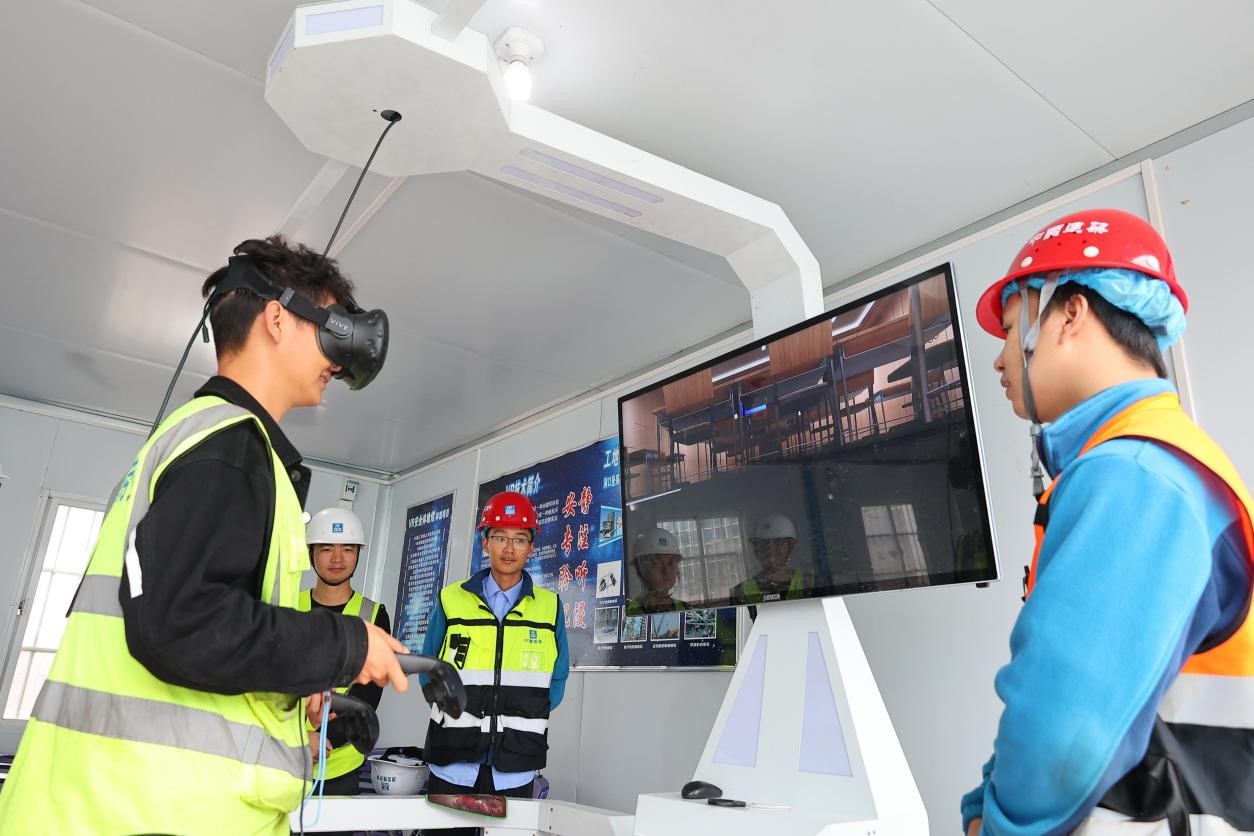China sees accelerated application of VR technology
Virtual reality (VR), a cutting-edge new-generation information technology and a frontier of digital economy, is developing rapidly in China and seeping into every industry and all aspects of people's life, from industrial production to culture and tourism, and to popular science and entertainment.
Recently, the 2022 World Conference on VR Industry was held in Nanchang, capital of east China's Jiangxi province. The conference was joined by over 3,000 experts and entrepreneurs from some 20 countries and regions.

A child "pilots" a plane via a VR program at the 2022 World Conference on VR Industry in Nanchang, east China’s Jiangxi province, Nov. 13, 2022. (People's Daily Online/Bao Gansheng)
A virtual emcee hosted the opening ceremony of the event, who mirrored and copied the actions and expressions of a real-person emcee in real time.
Over the recent years, the market of the Chinese VR industry has been constantly expanding. It more than doubled from 28.28 billion yuan ($3.95 billion) in 2019 to 58.39 billion yuan in 2021. The rapid growth is expected to maintain in the next three years and hit the 100-billion-yuan milestone in 2023.
A slew of policies have been issued to encourage better development of the emerging sector. Recently, five Chinese national authorities including the Ministry of Industry and Information Technology (MIIT) jointly issued a five-year action plan from 2022 to 2026, aiming to further integrate virtual reality (VR) with industrial applications.
According to the action plan, by 2026, the VR technology should be massively applied in major sectors of the economy and society, and several key enterprises and industrial clusters that are internationally competitive shall be nurtured.
The action plan also proposed to drive new types of consumption in the cultural sector with new business forms deriving from VR.
At present, the application of VR technology in industries is generating a number of new products and services.

Tourists in traditional Chinese costumes visit the Humble Administrator's Garden, a UNESCO World Heritage Site in Suzhou, east China's Jiangsu province, via a VR program, July 26, 2022. (People's Daily Online/Wang Jiankang)
For instance, in the cultural and tourism industry, VR is no longer about virtual 3D modeling; it has evolved into a more mature form which builds an immersive environment and offers rich interaction scenarios through real-scene scanning.
The Xiangbi Mountain, also known as the Elephant Trunk Hill, has built a virtual version of itself in the Metaverse, which tourists can reach with just a click on their mouses or just a tap on their mobile phone screens.
Besides, VR has also been employed in school education and vocational training. VR classrooms and VR driving schools are already functioning in many places.
At the Tianjin Eco-City School Affiliated to Beijing Normal University, students can finish physical experiments by just flipping a card on their smart desks, which not only makes experiments safer, but also improves the teaching efficiency of teachers.

A construction worker joins a VR safety program at a construction site in southwest China's Chongqing municipality, May 29, 2022. (People's Daily Online/Sun Kaifang)
The Xiaoshan power company of the State Grid Corporation of China in Hangzhou, east China's Zhejiang province has set up a VR room for a power safety training school at a local power substation. With a VR headset, trainees can get into virtual environments with workplace safety hazards, which helps build and consolidate their safety awareness.
An industrial chain of the VR sector has taken shape in China. According to the five major tasks raised by the action plan, the Chinese VR industry is accelerating its efforts to improve its basic technology system.
China has approved a national quality inspection center for VR and augmented reality products to improve the performance of products and the industry's technological capability. Besides, relevant departments have launched nearly 20 national and industrial specifications in the past three years.
The MIIT recently approved the establishment of a national VR innovation center that builds platforms for generic technology development, verification, testing, and technical services, as well as talent cultivation.
It is expected that by 2026, the Chinese VR industry will exceed 350 billion yuan ($48.1 billion), and a development paradigm featuring the common prosperity of technology, products, services and applications will be built.
Photos
Related Stories
- Contracts totaling over 10 bln USD signed at VR industry conference in China
- China sees strong investment in VR in 2021
- "Futuristic techs" showcased at 2022 World Internet Conference
- Highlights of 2022 World Internet Conference in Wuzhen, east China’s Zhejiang
- China's new biomedical imaging facilities to improve understanding of diseases
- China unveils plan on VR development
Copyright © 2022 People's Daily Online. All Rights Reserved.









